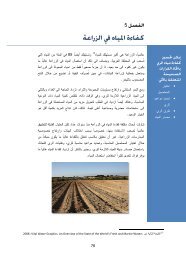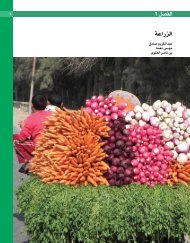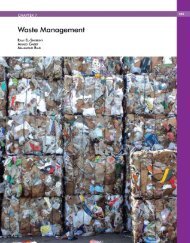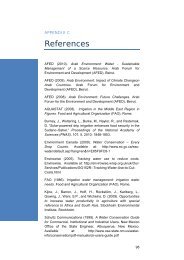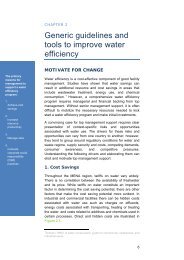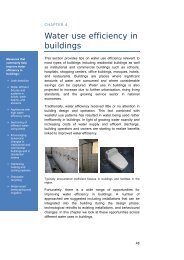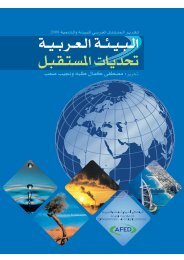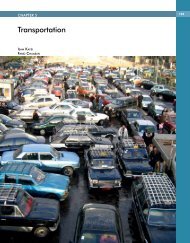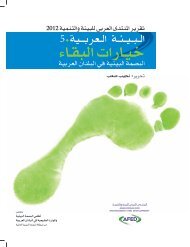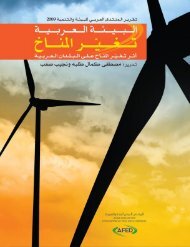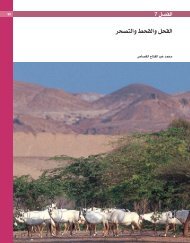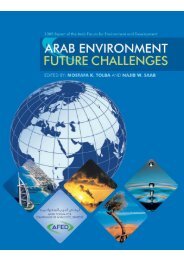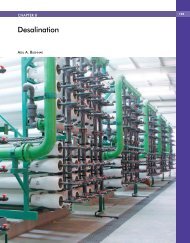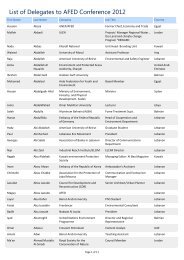Impact of Climate Change on Arab Countries - (IPCC) - Working ...
Impact of Climate Change on Arab Countries - (IPCC) - Working ...
Impact of Climate Change on Arab Countries - (IPCC) - Working ...
Create successful ePaper yourself
Turn your PDF publications into a flip-book with our unique Google optimized e-Paper software.
ARAB ENVIRONMENT: CLIMATE CHANGE 149<br />
do not allow for complacency. The <strong>Arab</strong> regi<strong>on</strong>’s<br />
minimal c<strong>on</strong>tributi<strong>on</strong> to climate changing GHG<br />
emissi<strong>on</strong>s is dwarfed by the regi<strong>on</strong>’s immense vulnerability<br />
to climate change, be it through rising<br />
temperatures, water scarcity, desertificati<strong>on</strong>, sea<br />
level rise, or even c<strong>on</strong>flict (AFED, 2008). Like<br />
many other countries, <strong>Arab</strong> countries have a vested<br />
interest to push forcefully for an independent envir<strong>on</strong>mental<br />
system that houses a diversity <str<strong>on</strong>g>of</str<strong>on</strong>g> climate<br />
change mitigati<strong>on</strong> policies and <str<strong>on</strong>g>of</str<strong>on</strong>g>fers a mixture <str<strong>on</strong>g>of</str<strong>on</strong>g><br />
positive and negative measures to achieve its ends.<br />
The following are recommendati<strong>on</strong>s for the <strong>Arab</strong><br />
states to c<strong>on</strong>sider as they cooperate with other<br />
countries in the development <str<strong>on</strong>g>of</str<strong>on</strong>g> a new climate<br />
change mitigati<strong>on</strong> framework:<br />
• In additi<strong>on</strong> to the well-known tools <str<strong>on</strong>g>of</str<strong>on</strong>g> trade policies,<br />
measures such as access to technology and<br />
finance and building <str<strong>on</strong>g>of</str<strong>on</strong>g> infrastructural capacities<br />
are essential for a fair and equitable outcome.<br />
These measures should be negotiated within the<br />
framework <str<strong>on</strong>g>of</str<strong>on</strong>g> a separate post-Kyoto MEA outside<br />
the purview <str<strong>on</strong>g>of</str<strong>on</strong>g> the WTO.<br />
• Access to affordable clean technology to reduce<br />
emissi<strong>on</strong>s should be negotiated al<strong>on</strong>g the lines <str<strong>on</strong>g>of</str<strong>on</strong>g><br />
the clean development mechanism (CDM) in<br />
the Kyoto Protocol, e.g. developed countries<br />
could provide financing for the mitigati<strong>on</strong> and<br />
adaptati<strong>on</strong> measures <str<strong>on</strong>g>of</str<strong>on</strong>g> the developing countries.<br />
• Developing clean energy technologies should be<br />
a top priority; the abundance <str<strong>on</strong>g>of</str<strong>on</strong>g> alternative energy<br />
sources in the <strong>Arab</strong> world should be harnessed<br />
to facilitate climate change mitigati<strong>on</strong> as well as<br />
ec<strong>on</strong>omic development.<br />
• <strong>Arab</strong> countries will also have to be very careful to<br />
ensure that any trade measures incorporated in<br />
the post-Kyoto Protocol are in c<strong>on</strong>formity with<br />
the rules and disciplines <str<strong>on</strong>g>of</str<strong>on</strong>g> the internati<strong>on</strong>al<br />
trade regime, i.e. fulfilling the relevant criteria <str<strong>on</strong>g>of</str<strong>on</strong>g><br />
the WTO.<br />
• It is essential for <strong>Arab</strong> states to reach a c<strong>on</strong>sensus<br />
am<strong>on</strong>gst themselves <strong>on</strong> a unified positi<strong>on</strong> regarding<br />
the <strong>on</strong>going negotiati<strong>on</strong>s in the WTO <strong>on</strong><br />
envir<strong>on</strong>mental goods and services as well as<br />
PPMs.<br />
• Ultimately, the <strong>Arab</strong> world should seek to<br />
demarcate the boundary between a post-Kyoto<br />
MEA and the WTO.<br />
REFERENCES<br />
<strong>Arab</strong> Forum for Envir<strong>on</strong>ment and Development – AFED<br />
(2008). <strong>Arab</strong> Envir<strong>on</strong>ment, Future Challenges. AFED<br />
Annual Report 2008. N. Saab and M.K. Tolba (Eds.).<br />
Beirut, Leban<strong>on</strong>: Technical Publicati<strong>on</strong>s.<br />
Hmaidan, Wael (2007). “<str<strong>on</strong>g>Climate</str<strong>on</strong>g> change will not spare<br />
the <strong>Arab</strong> World.”<br />
http://www.mectat.com.lb/metopics/climate/climat.ht<br />
m [accessed February 12, 2009].<br />
Internati<strong>on</strong>al Energy Agency – IEA (2007). World<br />
Ec<strong>on</strong>omic Outlook (WEO) 2007.<br />
Intergovernmental Panel <strong>on</strong> <str<strong>on</strong>g>Climate</str<strong>on</strong>g> <str<strong>on</strong>g>Change</str<strong>on</strong>g> – <strong>IPCC</strong><br />
(2007), Summary for Policymakers. In: <str<strong>on</strong>g>Climate</str<strong>on</strong>g><br />
<str<strong>on</strong>g>Change</str<strong>on</strong>g> 2007: The Physical Science Basis.<br />
C<strong>on</strong>tributi<strong>on</strong> <str<strong>on</strong>g>of</str<strong>on</strong>g> <strong>Working</strong> Group I to the Fourth<br />
Assessment Report <str<strong>on</strong>g>of</str<strong>on</strong>g> the Intergovernmental Panel <strong>on</strong><br />
<str<strong>on</strong>g>Climate</str<strong>on</strong>g> <str<strong>on</strong>g>Change</str<strong>on</strong>g> [Solom<strong>on</strong>, S., D. Qin, M. Manning, Z.<br />
Chen, M. Marquis, K.B. Averyt, M.Tignor and H.L.<br />
Miller (eds.)]. Cambridge University Press, Cambridge,<br />
United Kingdom and New York, NY, USA.<br />
UNEP, IISD (2000). Envir<strong>on</strong>ment and Trade: a<br />
Handbook. United Nati<strong>on</strong>s Envir<strong>on</strong>ment Program,<br />
Internati<strong>on</strong>al Institute for Sustainable Development,<br />
Canada.<br />
World Trade Organizati<strong>on</strong> - WTO (1998). United<br />
States-Import Prohibiti<strong>on</strong> <str<strong>on</strong>g>of</str<strong>on</strong>g> Shrimp and Certain<br />
Shrimp Products, AB Report, WT/DS58/AB/R<br />
(12 October 1998).<br />
NOTES<br />
(i)<br />
Compared to OECD countries whose share <str<strong>on</strong>g>of</str<strong>on</strong>g><br />
emissi<strong>on</strong>s is 41.9%. See UNDP (2007/2008),<br />
Human Development Report: UAE, United<br />
Nati<strong>on</strong>s Development Program, New York.<br />
Available at:<br />
http://hdrstats.undp.org/countries/country_fact_<br />
sheets/cty_fs_ARE.html , accessed March 12,<br />
2009.<br />
(ii) UN C<strong>on</strong>ference held in Rio de Janeiro in 1992<br />
<strong>on</strong> Envir<strong>on</strong>ment and Development. Principle 7<br />
stipulates that “In view <str<strong>on</strong>g>of</str<strong>on</strong>g> the different<br />
c<strong>on</strong>tributi<strong>on</strong>s to global envir<strong>on</strong>mental<br />
degradati<strong>on</strong>, States have comm<strong>on</strong> but<br />
differentiated resp<strong>on</strong>sibilities.”<br />
(iii)<br />
(iv)<br />
Report presented to Singapore 1st Ministerial<br />
Meeting (December 1996) paragraph 174 (i, ii,<br />
iii, iv, v)<br />
In the shrimp-turtle dispute case, the Appellate<br />
Body went as far as it could in trying to identify<br />
with the US’ ‘unilateral’ ban <strong>on</strong> shrimp labeling<br />
it “as an appropriate means to an end”, yet<br />
stopped short <str<strong>on</strong>g>of</str<strong>on</strong>g> giving its blessing for the<br />
err<strong>on</strong>eous applicati<strong>on</strong> <str<strong>on</strong>g>of</str<strong>on</strong>g> the measure which<br />
proscribed the use <str<strong>on</strong>g>of</str<strong>on</strong>g> a specific fishing method<br />
in order to c<strong>on</strong>serve sea turtles. It not <strong>on</strong>ly



